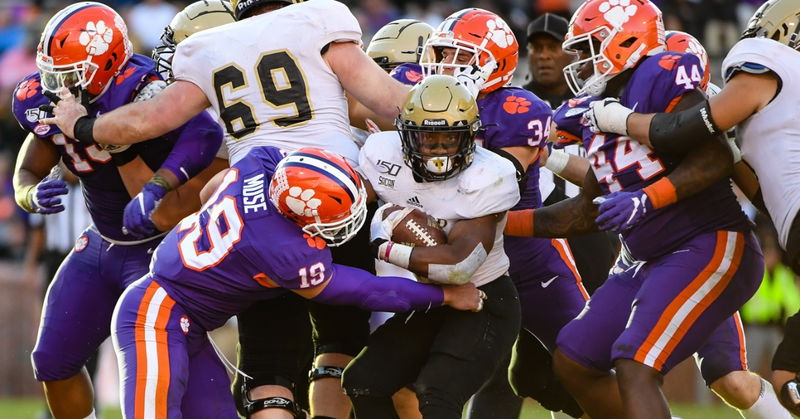
College football cupcake games and harsh realities of future |
College athletics differ from professional sports in many ways. One of those is the diverse range of programs that compete. From small private schools, to service academies, to huge national universities, they run the gamut.
While professional sports use revenue sharing and salary caps to level the playing field, college athletics have no such pretense. Games regularly occur between teams with massive differences in school size and athletic revenues. While this leads to more than a few lopsided games, it's part of the personality of college sports (who can forget Boise State’s Statue of Liberty Fiesta Bowl game-winner?). One aspect of this is “cupcake” games. A bigger school like Clemson pays a smaller school to play them at home without a future visit to their stadium in return. Clemson paid Charlotte $1 million and Wofford $360,000 to do this last season. This has gone on for ages, but really increased after a 2002 rule change allowed schools to schedule 12 football games instead of the 11 games they were permitted before. Most major football programs have utilized the extra game to add a seventh home game. Since 2006, Clemson has enjoyed seven home games each year and has paid an in-state FCS opponent each year to help do that. While there are exceptions, particularly among schools participating in neutral site games (e.g., Georgia), this has become more common than not, and smaller schools have grown accustomed to the revenue it generates. With COVID-19 impacting the college football season, the Big Ten and Pac-12 have already cancelled all non-conference games. Other conferences appear headed in a similar direction. That means big losses for small programs that have become dependent on revenue from those road trips and often are often struggling to fund the sports they have. Akron, for example, a non-conference opponent tentatively on Clemson’s 2020 schedule, announced plans to cut three sports to save $4.4 million as non-athletic revenues (e.g., student fees) were already subsidizing an athletic department in the red even before COVID-19 hit. FCS schools like the Citadel, another tentative Clemson opponent, routinely have athletic department revenues under $20 million. Losing the guaranteed payout from a school like Clemson certainly hurts. Schools found a win-win for a time. The bigger program has enjoyed the revenue and the local economic boost from an extra home game, and the smaller program generally has taken a lopsided loss but rakes in a multiple of what they would in ticket sales for a home game. Major programs are not obligated to use one of their precious 12 games to help these schools balance their budget though. Furthermore, a $500,000 guarantee for an athletic department generating $20 million comprises only 2.5% of revenues anyway. With inconsistent COVID-19 testing protocols between conferences, it seems we shouldn’t expect to see these games this season. While they’ll likely return in 2021 as schedules are already set, there may well be long-term changes to college football as a result of the madness of 2020. For one, consecutive seasons without seven home games in Clemson (only six are scheduled for 2021, with a neutral site game vs. Georgia set for Charlotte) may prove that getting the full complement of seven home games isn’t a must. Creating a more nationally respected schedule may become more important. Further, canceling these games in 2020 may highlight just how little they’re missed by fans. Dropping these cupcake games in the short or long-term may mean smaller athletic departments have to cut sports like men’s golf, men’s cross-country, and women’s tennis (the three sports Akron cut at in May). It’s heartbreaking whenever that happens. Athletes are forced to transfer or retire and there are surely tears. At the same time, is it fair to ask football players to play a game that isn’t helpful to their season’s goals? Is it fair to ask fans to buy tickets to watch an non-competitive game to benefit a sport they don’t watch at a school they don’t have ties to? We don’t know what the future after COVID-19 will look like in college athletics, but things look to be changing. If that means fewer cupcake games, small programs must be ready. Smaller programs depending on subsidies from major college programs if the deal stops being a win-win may be unwise.
 Upgrade Your Experience!
Upgrade Your Experience!
Unlock premium boards and exclusive features (e.g. ad-free) by upgrading your account today.
Upgrade Now!



